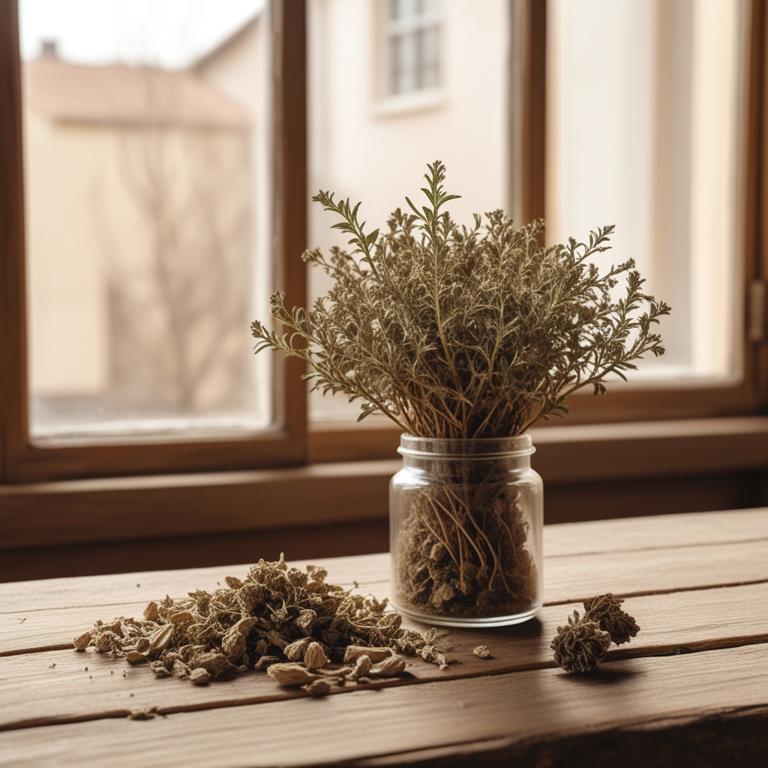Updated: Dec 1, 2024
Ankylosing Spondylitis: Causes, Medicinal Herbs, and Natural Supplements for Joint Health
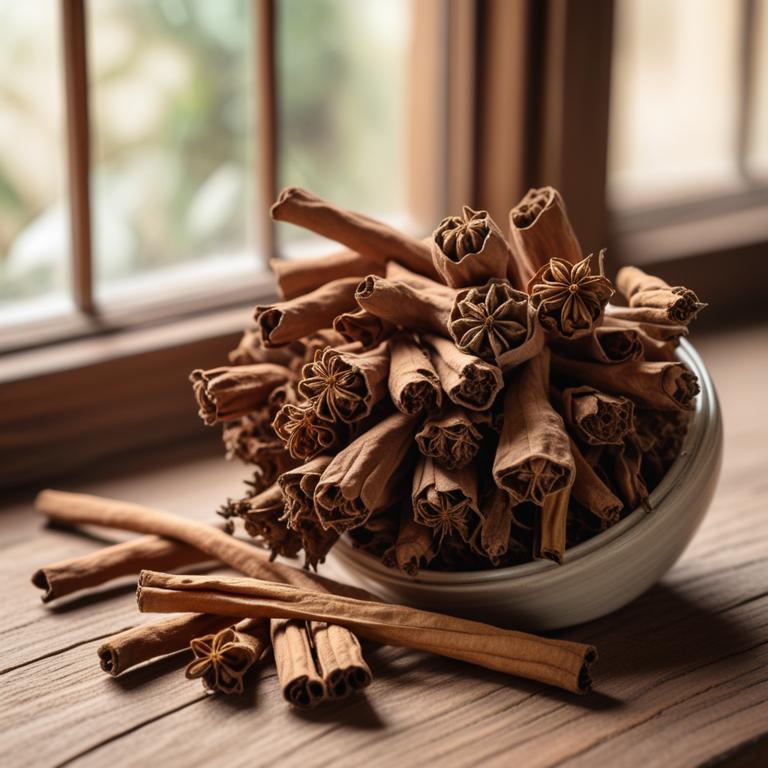
Ankylosing spondylitis is a chronic inflammatory disease that affects the spine and other joints.
It causes pain, stiffness, and limited mobility, making everyday activities like walking or bending difficult. Imagine waking up every morning feeling like you're 80 years old, with a body that's no longer yours. It can be frustrating and demotivating. The exact cause of ankylosing spondylitis is still unknown, but it's believed to be linked to a combination of genetic and environmental factors. Some people may be more susceptible due to their genetic makeup, while others may trigger the condition through stress, poor diet, or lack of exercise.
Fortunately, herbal remedies can provide relief from the symptoms of ankylosing spondylitis. Herbs like turmeric, ginger, and ashwagandha have anti-inflammatory properties that can help reduce pain and inflammation. Willow bark, which contains salicin, a compound similar to aspirin, can also help alleviate pain and stiffness. To use these herbs, you can try drinking teas made from dried turmeric or ginger roots. Ashwagandha can be taken as a supplement or added to a warm bath for relaxation. Willow bark tea can be consumed 2-3 times a day to help manage pain.
You can also consider making a paste by mixing turmeric powder with warm water and applying it directly to the affected areas.
Table of Contents
- What causes ankylosing spondylitis to occur?
- What are the advantages of using herbal remedies for ankylosing spondylitis?
- What are the primary medicinal herbs recommended for ankylosing spondylitis?
- What are the most widely used herbal preparations for alleviating ankylosing spondylitis symptoms?
- What herbs may not be suitable for people with ankylosing spondylitis?
- FAQ
What causes ankylosing spondylitis to occur?
The main causes of ankylosing spondylitis are a combination of genetic and environmental factors.
One of the main causes is the presence of the HLA-B27 gene. This gene is a part of the immune system, and people who have it are more likely to develop ankylosing spondylitis. However, having the gene does not guarantee the development of the disease. Genetic predisposition plays a significant role in ankylosing spondylitis. If one or both parents have the condition, their children are more likely to develop it. This is because the genetic factors that contribute to the disease are passed down from parents to their children. Family history is also an important factor.
If there is a history of ankylosing spondylitis in the family, it increases the likelihood of developing the disease. This is because the genetic factors that contribute to the disease are more likely to be present. Inflammatory bowel disease, such as Crohn's disease and ulcerative colitis, can also increase the risk of developing ankylosing spondylitis. This is because both conditions are related to the immune system and can trigger inflammation in the body. Psoriasis, a skin condition characterized by red, scaly patches, can also increase the risk of developing ankylosing spondylitis. This is because both conditions are related to the immune system and can trigger inflammation in the body. Reactive arthritis is another condition that can increase the risk of developing ankylosing spondylitis. This is a type of arthritis that occurs as a reaction to an infection, often in the gut.
It can trigger inflammation in the body and increase the risk of developing ankylosing spondylitis.
What are the advantages of using herbal remedies for ankylosing spondylitis?
Herbs can bring relief to people with ankylosing spondylitis, a chronic condition that affects the spine and other joints.
One of the main benefits of using these natural remedies is that they can help reduce inflammation and pain in the body. This is especially helpful for people who experience stiffness and discomfort in their back and joints, which can make everyday activities difficult.
Herbs can also improve flexibility and mobility, making it easier to move around and perform daily tasks. Additionally, they may help reduce the risk of developing new symptoms and slow down the progression of the disease. By supporting the immune system and promoting relaxation, herbs can also help manage stress and anxiety, which are common companions to ankylosing spondylitis.
Furthermore, herbs can be a safer alternative to some traditional medications, with fewer side effects and no risk of dependency.
What are the primary medicinal herbs recommended for ankylosing spondylitis?
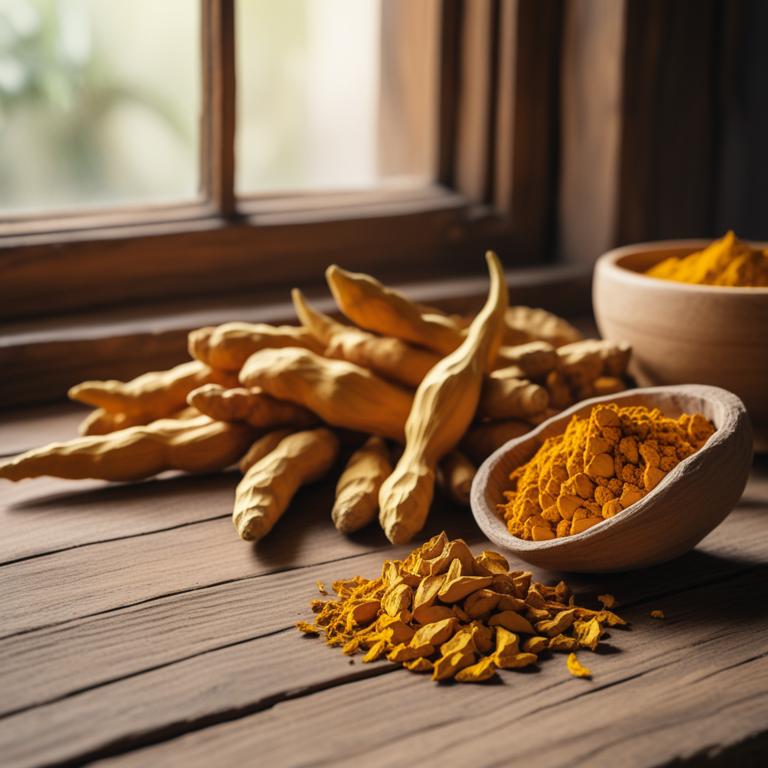
If you have ankylosing spondylitis, you're likely looking for ways to ease your pain and inflammation.
Herbs can be a great addition to your treatment plan. One herb that's been shown to help is Curcuma longa, or turmeric. It contains a powerful compound called curcumin, which has strong anti-inflammatory properties that can reduce swelling and pain in your joints. Another herb that can help is Zingiber officinale, or ginger. It has anti-inflammatory compounds called gingerols and shogaols that can block pain-causing chemicals in your body. Ginger can also help reduce nausea and improve digestion, which can be a problem for people with ankylosing spondylitis. Licorice root, or Glycyrrhiza glabra, is another herb that's been used for centuries to treat inflammation and pain.
It has anti-inflammatory compounds called glycyrrhizin and flavonoids that can help reduce swelling and pain in your joints. However, it's essential to note that licorice root can interact with certain medications, so talk to your doctor before using it. Ashwagandha, or Withania somnifera, is an herb that's been used in Ayurvedic medicine for thousands of years to treat stress and anxiety. It's also been shown to have anti-inflammatory properties that can help reduce pain and inflammation in your joints. Finally, Capsicum annuum, or cayenne pepper, contains a compound called capsaicin that can help block pain-causing chemicals in your body. It can also increase blood flow to your joints, which can help reduce pain and stiffness. When using these herbs, it's essential to talk to your doctor before adding them to your treatment plan.
They can interact with certain medications or have side effects, so it's crucial to use them safely and under medical supervision.
What are the most widely used herbal preparations for alleviating ankylosing spondylitis symptoms?

Herbal preparations can be a helpful addition to the treatment plan for ankylosing spondylitis, a chronic inflammatory disease that affects the spine.
Decoction, a liquid extract made from boiling herbs, is a good option because it helps to break down the plant's cellular structure, releasing its active compounds that can soothe inflammation and reduce pain. Infusion, another liquid extract, is made by steeping herbs in hot water, which can be gentler on the body than decoction.
Tincture, a concentrated liquid extract, is often used in small amounts and can be easily absorbed by the body, making it a convenient option for people who have trouble swallowing pills. Capsules, which contain dried herbs, are a popular choice because they can be easily taken with other medications and are often more convenient than loose herbs. Tea, a liquid extract made from steeping herbs in hot water, is a gentle and soothing way to take herbs and can be especially helpful for people who experience digestive issues.
These herbal preparations have anti-inflammatory and antioxidant properties that can help to reduce pain and stiffness associated with ankylosing spondylitis, and may even help to slow down the progression of the disease.
Additional Resources:
What herbs may not be suitable for people with ankylosing spondylitis?
If you have ankylosing spondylitis, you should be careful with certain herbs that might make your condition worse.
For example, Ephedra sinica contains a powerful stimulant that can raise your blood pressure and heart rate, which can be problematic for people with ankylosing spondylitis, a condition that can cause inflammation in the joints. This can lead to increased pain and discomfort.
Similarly, Podophyllum peltatum, also known as mayapple, contains a compound that can cause liver damage if taken in large quantities, which can be a concern for people with ankylosing spondylitis who may already be taking medications that can affect the liver. Aristolochia clematitis, a type of birthwort, has been linked to kidney damage and kidney failure in some cases, which can be a serious concern for people with ankylosing spondylitis who may already be at risk for kidney problems due to their condition. Pausinystalia johimbe, also known as yohimbe, contains a compound that can lower blood pressure, which can be a problem for people with ankylosing spondylitis who may already have low blood pressure due to their condition.
Additionally, Cinchona officinalis, a type of cinchona bark, contains a compound that can slow down blood clotting, which can increase the risk of bleeding and bruising, especially for people with ankylosing spondylitis who may already be taking medications that can increase the risk of bleeding.
FAQ
Are there any specific herbs that can prevent ankylosing spondylitis?
Ginger and turmeric have anti-inflammatory properties that may help with ankylosing spondylitis symptoms.
Ginger reduces pain and swelling, while turmeric's curcumin blocks chemicals that cause inflammation.
These herbs can be consumed as teas, added to meals, or taken as supplements, but their effectiveness may vary from person to person.
Is it safe to use herbal remedies for ankylosing spondylitis during pregnancy?
If you're pregnant and have ankylosing spondylitis, it's best to avoid herbal remedies unless you're under a doctor's care.
Some herbs can pass into the baby through the placenta and cause harm. For example, feverfew and willow bark can slow down the baby's heartbeat.
Always be cautious when taking any new remedy during pregnancy.
Are there any herbs that can reduce the frequency of ankylosing spondylitis?
Turmeric has compounds that may help reduce inflammation associated with ankylosing spondylitis.
Ginger has anti-inflammatory properties that could alleviate symptoms. Willow bark, a natural source of salicylic acid, has been used to ease joint pain and inflammation.
These herbs may help manage ankylosing spondylitis symptoms, but their effectiveness varies from person to person.
Can i combine different herbal remedies for ankylosing spondylitis?
You can try combining different herbal remedies for ankylosing spondylitis, but be cautious.
Some herbs can interact with each other or worsen symptoms. For example, ginger and turmeric can both reduce inflammation, but taking too much of either can cause stomach problems.
Start with small amounts and adjust as needed to find a combination that works for you.
Related Articles
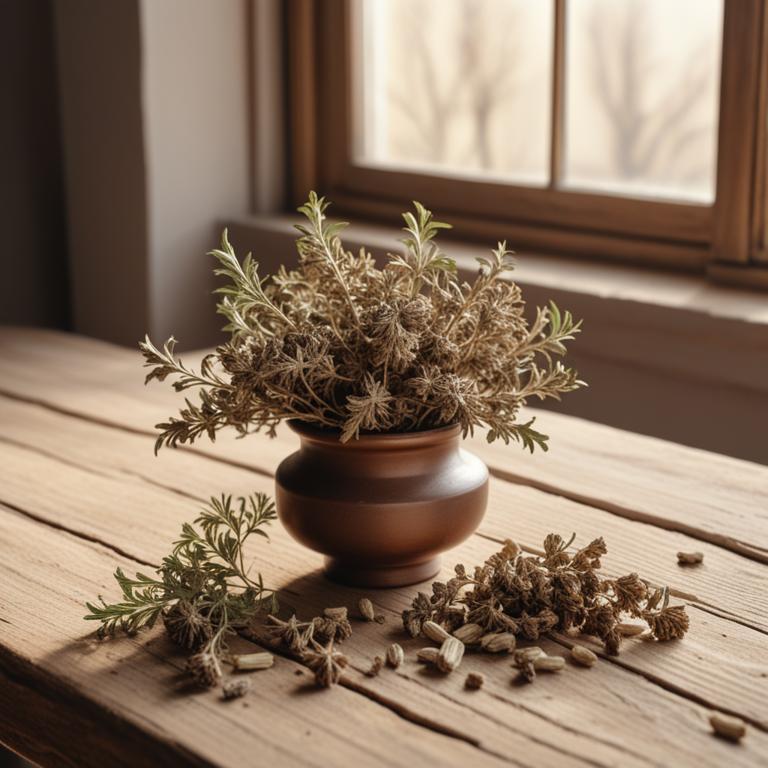
Difficulty Chewing: Understanding the Causes and Medicinal Herbs
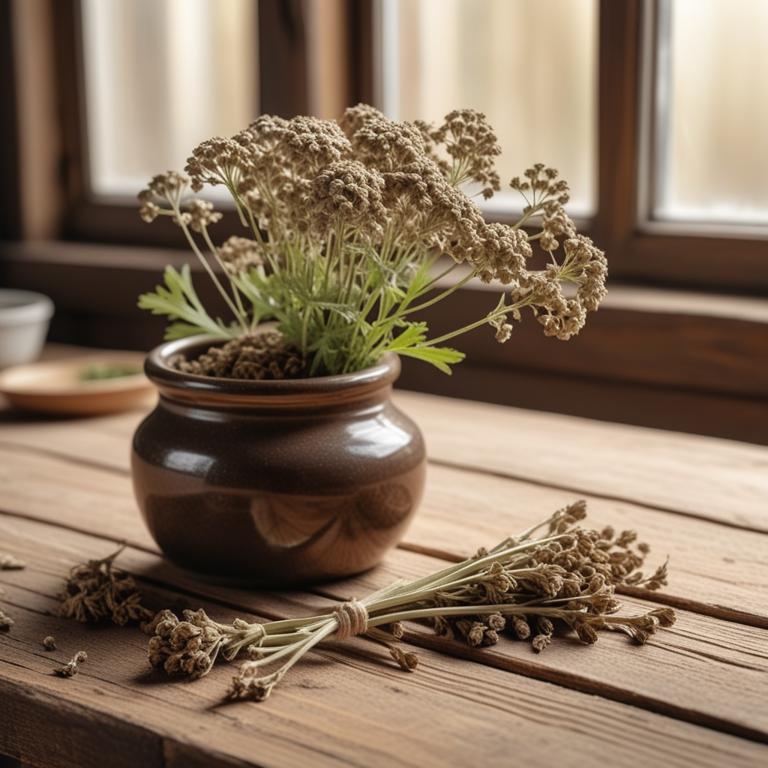
Understanding and Treating Leg Cramps with Medicinal Herbs

Understanding Bunion Causes and Using Medicinal Herbs for Relief

Jammed Finger Care: Causes, Medicinal Herbs, and Preparations
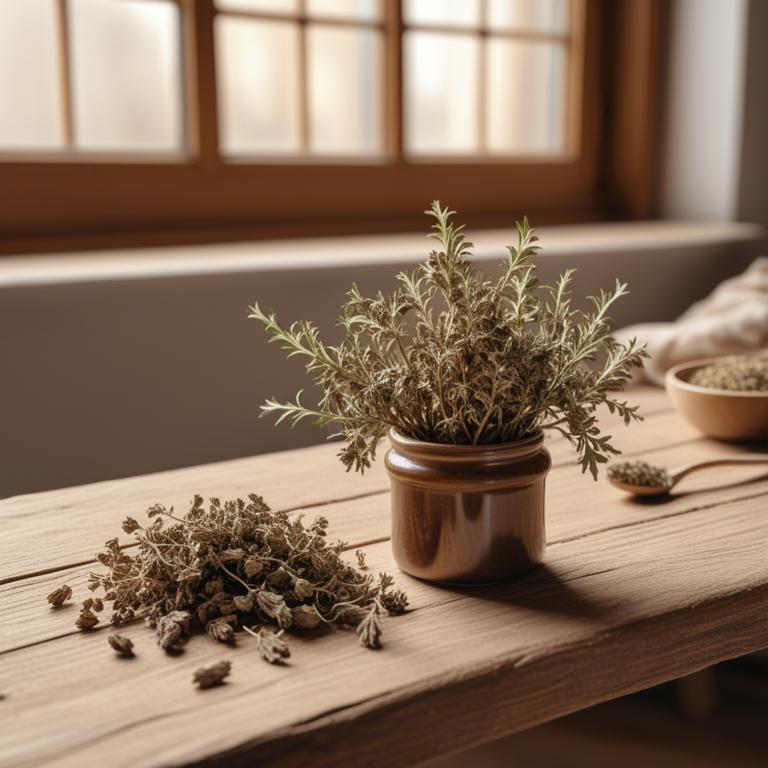
Bone Health: A Comprehensive Guide to Causes and Herbal Preparations






